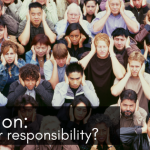
Pro or contra abortion – reflections ahead of March for Life
People say there are two sides to every coin. Every argument has pros and cons, and to come to the right conclusion, all viewpoints need to be taken into consideration. Sometimes, an agreement cannot be achieved, and in a tolerant society, we mustn’t force our views on anyone else. Right?
As regular users of social media we find ourselves bombarded with a hundred different views on different issues every single day. It can get so confusing and hence, it is vitally important not to get distracted by issues of mere preference and taste, as well as not to disengage over issues that really matter most.
If abortion was a rare occurrence in our country there probably wouldn’t be much of a debate about it. However, as 1 in 3 women will have at least one abortion before the age of 45, and circa 200,000 abortions happen every single year in the UK, it is clear the issue concerns a very large number, if not most of us. The hotly debated question of its rightness, wrongness or even necessity cannot be determined by the frequency at which abortions happen – we must go back and look at what exactly it is we are talking about.
Nobody would seriously believe that any woman (or man) should be denied healthcare or support in a difficult situation. Most of us are in favour of taking care of ourselves and our fellow human to the best of our ability, aiming to do good and to relieve suffering. We want to be able to exercise our freedom of choice in the way we live our lives, as well as allowing and enabling others to do the same. Many aspects of how our society functions are an expression of this, including the availability of choice in our education, recreation, relationships and general lifestyle. For this to be equally accessible to all of us, we generally accept and live by a common morality which is largely reflected in the law of our land, which includes our right to life, dignity and freedom of person. I can exercise my rights if this does not cause another human being to be robbed of their rights in turn, which means I do not have permission to rob anyone of their property or harm them physically or emotionally, and I may not end their life even if it is in my power to do so.
Because this is true and has been universally accepted, injustices like the Armenian genocide and the Nazi Holocaust are burnt into our world’s history as the most horrific reminders of human failure to abide by the common morality, which rejects the harming or killing of another. When I first learned about the mass-killing of mainly Jews during World War II, I found this very difficult to cope with – after all, I’m German myself and could not just shove it away as something that might have happened in a far away country – it happened in the country I lived in. Fellow countrymen and women, just like me, had enabled this horror to take place. I spent many years coming to terms with this awful truth.
But you know what? There are two sides to every coin! It has often been said that if Hitler had died in 1939 (rather than 1945) he would be remembered now as one who brought blessing to Germany rather than a curse. As a matter of fact, Hitler worked very hard to improve the infrastructure of Germany while in power, constructing dozens of dams, autobahns, railroads, and other civil works. Unemployment decreased drastically and many people saw a significant improvement in their standard of living. The insights, knowledge and discoveries attained through scientific experiments carried out on Jews, the disabled and other target groups by medical professionals such as infamous Dr. Joseph Mengele, gruesome as they were, are still benefiting medical practice worldwide today! Surely, this should justify the death of 6 million Jews – after all, they were not even considered human beings under German law at the time they were killed. (If you think I have lost my mind, I dare you to read on.)
There is no doubt at all that the availability of abortion has enabled many women to continue their careers, spend less money on nappies, children’s clothing and other child-related expenses. The government has been spared the cost of providing housing and benefits to growing families or the equipment and care expenses of special needs children. Mothers have been spared sleepless nights as well as the immense and real stresses of potentially being a single parent. You know what, let’s just say for the sake of the discussion that no woman has ever regretted having her abortion (which is a mockery of the truth), and that the proven short and long-term health risks associated with abortion don’t exist!
You may be reading this, thinking: “How dare this woman even associate abortion with the Nazi Holocaust?” It is as simple and as uncomfortable as it is true: Both scenarios involve the intentional mass-killing of vulnerable members of the human family for convenience! The Science of embryology is clear: From the moment of fertilisation, a living, unique and whole human being has come into existence. Even Ann Furedi, chief executive of BPAS, one of the UK’s leading abortion providers agrees that there is no doubt that the pre-born are human beings! Hear, hear!
So, the question regarding abortion can not possibly ever be whether the pros outweigh the cons. The question is: Does abortion intentionally end an innocent human life? If the answer is yes, it is time to toss the double-sided coin and face the reality that we must change course now as a nation on the issue. History already has reason to judge and shame us for our ignorance, selfishness and cruelty by treating the intended death of our most vulnerable fellow human beings as nothing more than a minor side effect of our “free choice” or access to so-called “health care”.

Come and join us for the March for Life this Saturday in Birmingham!

